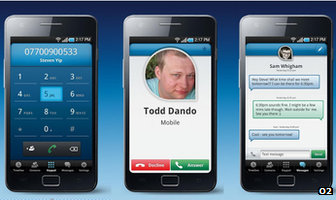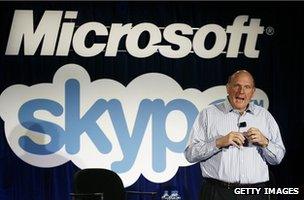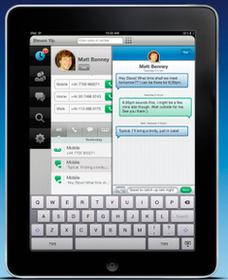O2's Tu Go aims to challenge Skype and other Voip apps
- Published

Tu Go allows O2 users to make calls to mobile and landline numbers without having to buy extra credit
O2 has launched an app which lets users make and receive phone calls and texts via a tablet, computer or smartphone.
Tu Go is available for Android, Apple's iOS devices and Windows 7 PCs but limited to "pay monthly" subscribers - so excludes corporate accounts.
Tu Go deducts charges from the user's existing call minutes allowance, unlike Skype and other chat apps which involve the purchase of credit.
Analysts suggest this billing innovation could prove disruptive.
O2's owner Telefonica has experimented with Voip (voice over internet protocol) before with its Tu Me app which was launched in 2012 with limited success.
However, the earlier program required both parties in the conversation to be using the software, while Tu Go only needs the the caller to have launched the app.
Web mail
Tu Go has been available through Apple's iOS store since October last year, but had previously restricted its functions to about 1,000 testers.
It works over wi-fi or 3G/4G data connections. The cost is the same as if the user had made a normal call through their O2 mobile.
The aim is to free people from being tied to a single handset, said product manager Caroline Dundas.

O2 is responding to competition from Microsoft's Skype unit and other Voip services
"Customers can now take their mobile number wherever they like, even away from their mobiles," she said.
Users can be logged into the service on up to five devices at once - meaning all will ring if they receive a call - including handsets using Sim cards associated with different networks and internet enabled gadgets such as iPods.
Ms Dundas likened the service to the way email developed.
"In the early days you could only access email from the machine it was installed on but then web mail came along and that allowed you to access messages from any device," she said.
"This is opening up comms in the same way."
Declining profits
The effort represents the telecom industry's latest attempt to tackle competition from Skype and other third-party Voip services.
These typically do not charge for app-to-app calls, but do require the user to buy credit if they want to call or send a text to a standard mobile or landline number.
BT already offers its own service - SmartTalk - offering its residential customers the ability to make calls on their smartphone for the same price as if they were using their landline.
Orange and T-Mobile are also finishing work on their own facility which they plan to roll out later this year,
But the scale of the threat was highlighted earlier this week when the chairman of China Mobile - the world's largest telecom carrier - said his firm was now more concerned about the challenge posed by Microsoft's Skype and Tencent's WeChat services than it was about competition from China's rival mobile networks.

Users can also use the app to send texts from their mobile number
"The networks are losing revenue from declining voice traffic," Chris Green, tech analyst at Davies Murphy Group, told the BBC.
"Some of it is down to services such as Skype but we are also just making fewer phone calls.
"So, they are all thinking of wacky new ways to get us making more calls - there is a lot more profit in voice than in data."
There are already dozens of Voip apps on the market including lesser-known names such as Tango, Fring, Bria and Zerofone as well as manufacturer's own services including BlackBerry BBM and Apple's Facetime.
But the Ovum telecoms consultancy believes Tu Go will stand out from the crowd.
"The application is more than just another "me too" Voip app by an operator," said analyst Jeremy Green.
"It is intrinsically linked to your existing telephone number and bill, so any charges are just deducted from your bundled call deal rather than you having to buy extra credit.
"It merges the best of internet telephony and old fashioned calls and and is a lesson for O2's peers in the industry."
- Published27 July 2012
- Published20 February 2013